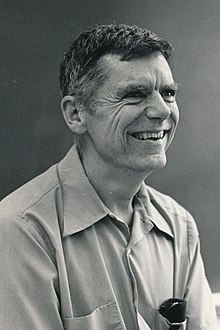| Philip G. Hodge Jr. | |
|---|---|
 | |
| Born | Philip Gibson Hodge Jr. (1920-11-09)November 9, 1920 New Haven, Connecticut, U.S. |
| Died | November 11, 2014(2014-11-11) (aged 94) Sunnyvale, California, U.S. |
| Education | |
| Occupation | Engineer |
| Spouse | Thea D. Hodge |
| Children | 3 |
| Engineering career | |
| Discipline | Mechanical Engineering |
| Institutions | Brown University Illinois Institute of Technology University of Minnesota |
| Significant advance | Advancement in plasticity theory |
| Awards | Theodore von Karman Medal (1985) ASME Medal (1987) Drucker Medal (2000) |
Philip Gibson Hodge Jr. (November 9, 1920 – November 11, 2014) was an American engineer who specialized in mechanics of elastic and plastic behavior of materials. His work resulted in significant advancements in plasticity theory including developments in the method of characteristics, limit-analysis, piecewise linear isotropic plasticity, and nonlinear programming applications. Hodge was the technical editor of American Society of Mechanical Engineers Journal of Applied Mechanics from 1971-1976. From 1984 to 2000 he was the secretary of the U. S. National Committee on Theoretical and Applied Mechanics, its longest serving Secretary. In 1949 he became assistant professor of Mathematics at UCLA, then moved on to become associate professor of applied mechanics at Polytechnic Institute of Brooklyn in 1953, Professor of Mechanics at Illinois Institute of Technology in 1957, and professor of mechanics at the University of Minnesota in 1971, where he remained until he retired in 1991. After retirement he was professor emeritus at the University of Minnesota and visiting professor emeritus at Stanford University.
Education
Philip Hodge received a BA in mathematics from Antioch College in 1943. During World War II, he joined the US Merchant Marine, where he served throughout the war. Upon his return he earned a PhD from Brown University in Applied Mathematics in 1949, where he was a student of William Prager.
Awards
- 2000 - ASME Daniel C. Drucker Medal by the American Society of Mechanical Engineers
- 1987 - ASME Medal by the American Society of Mechanical Engineers
- 1985 - Theodore von Karman Medal by the American Society of Civil Engineers
- 1984 - Distinguished Service Award by the American Academy of Mechanics
- 1983 - Euler Medal by the USSR Academy of Sciences
- 1975 - Worcester Reed Warner Medal by the American Society of Mechanical Engineers
Memberships and fellowships
- Member of the United States National Academy of Engineering elected in 1977
Books
- Prager, William; Hodge, Philip G Jr. (1951). Theory of Perfectly Plastic Solids. John Wiley & Sons. LCCN 51-012695.
- Goodier, J.N. Jr.; Hodge, Philip G Jr. (1958). Elasticity and Plasticity. John Wiley & Sons. LCCN 58-006750.
- Hodge, Philip G Jr. (1981). Plastic Analysis of Structures. Krieger Publishing Company. LCCN 80-026340.
- Hodge, Philip G Jr. (1963). Limit Analysis of Rotationally Symmetric Plates and Shells. Prentice-Hall Inc. LCCN 63-016582.
- Hodge, Philip G Jr. (1970). Continuum Mechanics. McGraw-Hill Book Company. LCCN 70-090012.
Personal life
Married Thea D. Hodge (née Theresa E. Drell) in 1943 and they have three children: Susan Edith Hodge, Philip Tully Hodge, and Elizabeth Muriel Hodge Kelly.
Other Achievements
- 1982 Twin Cities Marathon, Winner Master's Division Men 60-69
References
- "Phil Hodge New Technical Editor of the Journal of Applied Mechanics". Journal of Applied Mechanics. 38 (3): 577. 1971. Bibcode:1971JAM....38..577.. doi:10.1115/1.3408854.
- "USNC/TAM Newsletter No. 10 (1998-99)". Archived from the original on 2015-09-24. Retrieved 2014-11-17.
- "Archives & Special Collections · University of Minnesota Libraries".
- https://web.stanford.edu/dept/registrar/bulletin_past/bulletin00-01/pdf/MechEng.pdf
- "Daniel C. Drucker Medal". www.asme.org.
- "ASME Medal". www.asme.org.
- Theodore von Karman Medal
- "Awardees for AAM Outstanding Service Award". Archived from the original on 2011-07-20. Retrieved 2010-12-15.
- "Worcester Reed Warner Medal - Engineering Literature Awards". Archived from the original on 2017-06-23. Retrieved 2014-11-16.
- "Dr. Philip G. Hodge". NAE Website.
- "Archived copy" (PDF). Archived from the original (PDF) on 2014-11-29. Retrieved 2014-11-16.
{{cite web}}: CS1 maint: archived copy as title (link)
External links
- Personal Website: Philip Hodge's Personal Webpage: The Opera Nut
- Archive: University of Minnesota: Philip G Hodge Archive
- 1920 births
- 2014 deaths
- American mechanical engineers
- University of California, Los Angeles faculty
- New York University faculty
- Illinois Institute of Technology faculty
- Stanford University faculty
- University of Minnesota faculty
- Brown University alumni
- Antioch College alumni
- United States Merchant Mariners
- United States Merchant Mariners of World War II
- Members of the United States National Academy of Engineering
- ASME Medal recipients